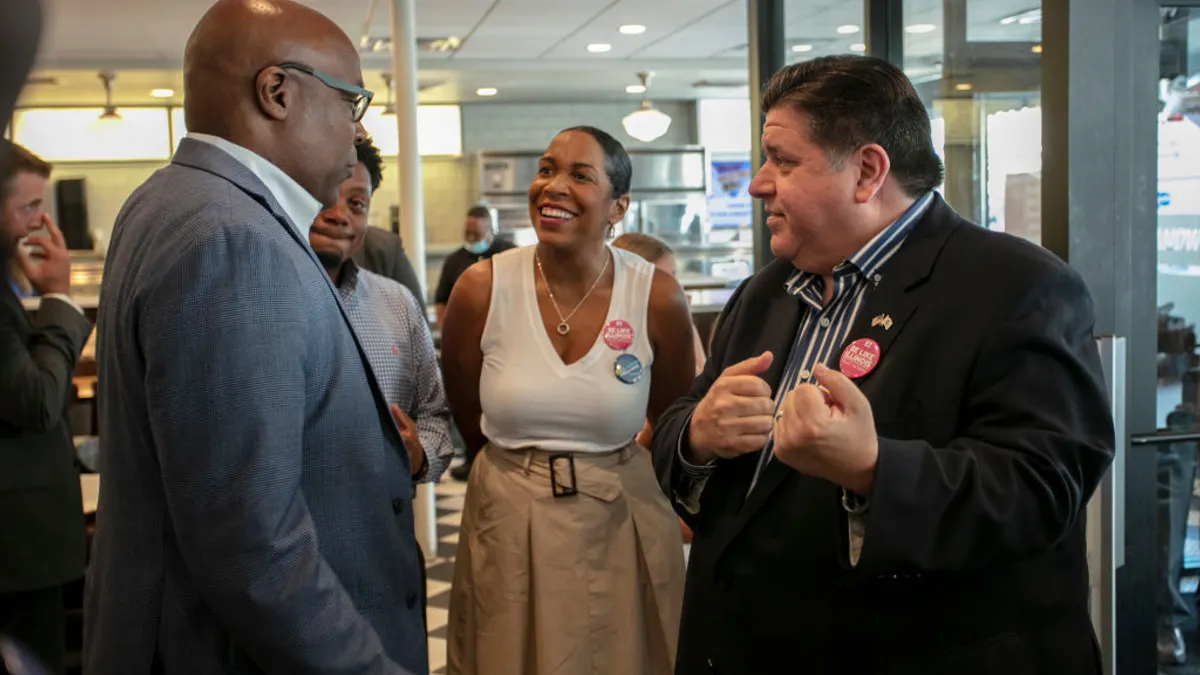Chai Feldblum, whose career as a commissioner of the U.S. Equal Employment Opportunity Commission (EEOC) spanned nine years and two presidential administrations, is ready to move on.
Long an advocate for the rights of LGBT individuals and those with disabilities, Feldblum was first nominated to the EEOC in 2009 by President Barack Obama. But it wasn't until 2010, when Obama appointed her and two others to the commission during a U.S. Senate recess, that she actually took her seat. Since then, she has been an influential presence both in government and in the employment law space generally. In that time, she told HR Dive in an interview, things have improved from a civil rights standpoint.
"We are a civil rights work in progress in this country, and I believe the trajectory has been in the right direction — the upward direction. Obviously we sometimes feel that things should be going more quickly and sometimes it feels like some things have stalled, but that's the reality."
In the same way, the EEOC experienced both successes and struggles in the last few years of Feldblum's second and last term. It issued a comprehensive, detailed report on workplace harassment before the #MeToo movement entered the public stage. It pursued more harassment charges, issued guidance documents and launched training initiatives with the aim of creating safe workplaces. But it also split with the Trump administration in some areas, not the least of which is its position that LGBT individuals are protected from employment discrimination by the sex discrimination provisions of Title VII of the 1964 Civil Rights Act.
But Feldblum isn't worried about the agency's future. She feels confident that it is heading in the right direction under Acting Chair Victoria Lipnic, she said, despite persistent funding issues and the fact that EEOC has lacked a quorum since her departure. And she signaled that her next phase won't be entirely unrecognizable from her last.
Points of pride
Feldblum's early work included a part in the drafting process of the Americans with Disabilities Act (ADA), and she later continued that work as part of the team of drafters behind the ADA Amendments Act of 2008. She's proud of that work not only because of her passion for the subject, she said, but also because of the bipartisan nature of the lawmaking process. Her bipartisan work with Lipnic, a Republican, in particular had been the proudest aspect of her time at EEOC, she said.
"I am someone who by nature likes to hear everybody and understand all aspects of a situation, and not to come in with an ideologically rigid position," Feldblum said. "That is who I am by my nature, the way I've been for 35 years of my professional life. I'm proud that I was able to have that part of me come out in spades, and that's because I've had employers who are willing to engage in dialogue with me, and a Republican fellow commissioner who had the same attitude towards governance of the agency."
The two often appeared together outside of EEOC hearings, speaking at conferences like the American Bar Association's annual labor and employment law conference. Yet, bipartisan work isn't easy, Feldblum said, noting the necessity of building a rapport with her colleague when the two began working on agency regs implementing the ADA Amendments Act. "We both entered those negotiations in such good faith, we worked through some very tough issues, we compromised in a way that maintained our integrity, and we put out, I think, a very good set of regulations."
That same attitude allowed the agency to tackle a plethora of other issues, she said, including LGBT protections and protections for pregnant workers under the Pregnancy Discrimination Act.
Viewpoints on discrimination, harassment
EEOC opposes the Trump administration's U.S. Department of Justice (DOJ) on Title VII coverage. The two entities disagree on one aspect of the law specifically: whether its prohibition of discrimination on the basis of "sex" extends to discrimination on the basis of one's sexual orientation or, as a separate but related matter, gender identity.
Feldblum takes the commission's view — that Title VII does prohibit such discrimination — but explained that EEOC played a role in creating the controversy, having previously taken the position in the 1970s that there is an "artificial exclusion" of sexual orientation and gender identity from sex discrimination law, she said. "[It's] an absurd position as a matter of simple common sense," she said, "but it took that position and the courts bought it and went along with it." Feldblum called the agency's current position and work an attempt to "correct its mistake."
Moreover, the agency wrote opinions between 2012 and 2015 arguing its current stance that courts would later cite. It also continued to take in charges and assist LGBT people through enforcement activities. That downplays the significance of the split in the executive branch, in Feldblum's mind. "It's like the train had left the station," she said. "So by the time the DOJ was taking a different position, all that meant was, as the train was going through the different courts, the DOJ got to put forward its position."
"I feel that I have got over nine years a much more concrete sense of the challenges that employers face and the real commitment by many employers who want to do the right thing."

Chai Feldblum
Former EEOC Commissioner
The commission also convened a Select Task Force on Harassment in 2015; Feldblum and Lipnic co-chaired the task force and published the widely circulated report that captured much of its work. The report "set out a very important roadmap" for EEOC's prevention efforts, Feldblum said, as did testimony to the commission on reporting apps and training. She said there can "always be improvement" with respect to employer approaches to harassment prevention, but feels supporting employers is an important part of EEOC's mission.
"I feel like the job of the EEOC is to help them do the right thing, and obviously bring enforcement actions when they're not doing the right thing. But the reason I spent the time that I did on the harassment prevention work is because I wanted the agency to also provide support for some very hardworking HR and legal people who are trying to have their workplaces be safe and respectful and productive workplaces."
About that renomination
Feldblum's second term expired July 1, 2018, but she was renominated to her position for a third term by President Donald Trump in 2017 as part of a package deal, commonplace for executive appointments to federal agencies like EEOC. Feldblum agreed to serve another term. "I knew that I was not controversial within the business community," she said. "It seemed like that would not be a big deal for me to be confirmed with the other Republicans. That's why I said yes."
Then came the backlash. Republican Sen. Mike Lee of Utah, writing in an open letter to Trump that "I am not the lone objector," denounced Feldblum's appointment, calling her views on religious freedom "fundamentally incompatible with our Nation's long tradition of pluralism and religious freedom." To that end, Lee opposed the nomination, effectively confounding the generally straightforward nature of EEOC appointments and delaying the confirmation of the agency's two other appointees.
Feldblum responded to Lee's criticisms in a Medium post, but she had other concerns. "I have no less of a desire, no less of a commitment to the agency, no less of a desire to serve on the agency — that's all the same," she said. "But the new piece of information is that there's one person who does not want me to be on the commission, and that's stopping the entire commission from being fully constituted." After a year of talking with senators and others to reassure them of her positions in response to Lee's criticisms, there wasn't a question of what to do next, she said. "We have to put the agency ahead of me as one person."
And so, Feldblum withdrew her name from the nomination process. But she did stay on past the end of her term until the swearing in of the 116th U.S. Congress on Jan. 3, 2019, a move she explained is permitted by statute and routine for commissioners who are awaiting the confirmation of their replacements.
Next moves
Feldblum isn't sure where exactly she'll end up in 2019, but she doesn't plan on leaving the employment law community entirely. "I've come to realize that the knowledge and experiences I've gained — on how to help employers prevent harassment, how to help employers affirmatively create safe, respectful and diverse workplaces, where harassment does not happen — is something I want to use going forward."
It's not a surprising move, given Feldblum's past emphasis on interacting with employers, an aspect of her former position for which she expressed enjoyment. "I speak probably half the time to HR audiences and the other half to legal, general counsel type audiences, often together," she said, "but I feel that I have got over nine years a much more concrete sense of the challenges that employers face and the real commitment by many employers who want to do the right thing."
Speculation that she turned down an offer from her previous employer, Georgetown University Law Center, is inaccurate, she said. Though Feldblum had conversations with Georgetown about returning, she chose to go in a difference direction. "[I] ultimately decided that I would not pursue that because I felt this is the moment in time to take this knowledge I have to help employers do the right thing in creating safe, respectful and diverse workplaces."
Feldblum is now taking time to regroup with her chief of staff at EEOC, Sharon Masling, to "figure out the right platform, the right launching pad from which to offer these services." She hinted at doing some form of consulting, but would not give specifics.
"I have been so energized by the potential now to work with employers who so often want to do the right thing," she said. "I'm energized by the fact that I could potentially now work with some of those employers that I've met over the last nine years to help them to do that."




















